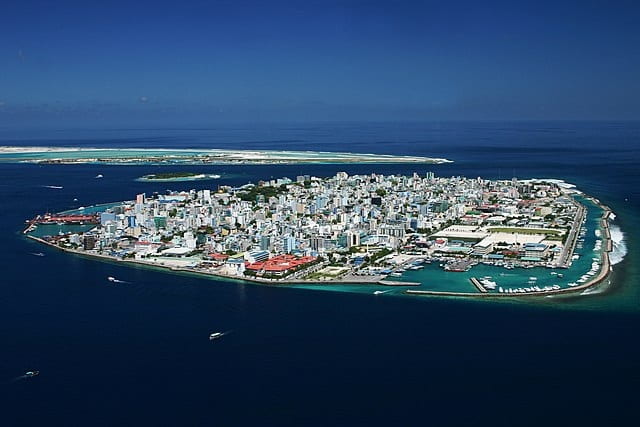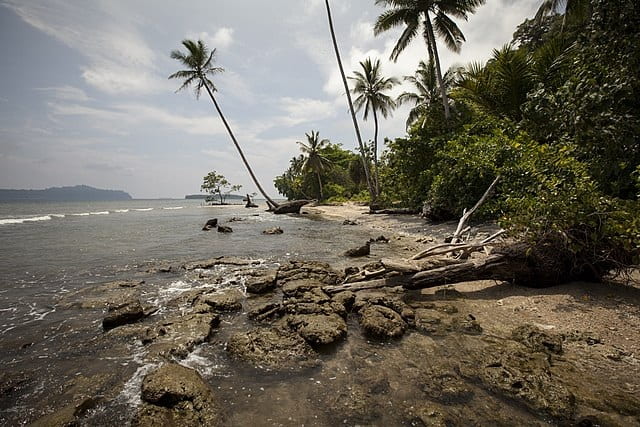The United Nations Climate Change Conference (COP26) is coming to a close in Glasgow, Scotland. Foreign dignitaries and climate change activists have made speeches, suggested and pledged goals, and discussed the future of living on Earth in the face of substantial environmental change. However, several countries at COP26 sought to demonstrate to their international peers that climate change is not just a future problem, it is actively shaping nation states as we speak. In giving his remote remarks at the conference, Tuvalu’s Foreign Affairs Minister Simon Kofe stood in the Pacific Ocean to illustrate the impending future of his country. The global climate crisis is affecting all nations, but not equally. The United States, Australia, and Europe have been subjected to increased natural disasters and temperature rise. Decades of industrialization from these regions have contributed to the accumulation of greenhouse gases that have spurred global warming. The catastrophes in developed nations are alarming as a forecast of the decades to come. But out in the ocean, island nations may be swallowed up by the rising sea levels.
Nations at Risk
Archipelagic nations, defined by the United Nations Convention of the Law of the Sea (UNCLOS) as chains of islands that share interconnected waters, history, and language, pockmark the Pacific and Indian Oceans. Tuvalu, the Marshall Islands, and the Maldives are archipelagic and epitomize the plight of nations that are threatened by coastal erosion.
Tuvalu’s coastal troubles are an everyday struggle for those that live in the islands. The phrase “Tuvalu is sinking” is a common saying by locals. Some Tuvaluans have resigned themselves to a reality where Tuvalu disappears into the sea, and with islands averaging just about nine feet above sea level, this is an understandable perspective. Now, with coastal erosion accelerated by harsh storms and rising prices of foodstuffs, remaining on disappearing islands may not be tenable for all Tuvaluans.
The people of the Marshall Islands are facing a similar race against time. Like Tuvalu’s Foreign Affairs Minister Simon Kofe, the Marshallese Climate Envoy Tina Stege implored her fellow delegates at COP26 that action can work to save her country. The plight of abrasive storms and coastal erosion is harming the Marshall Islands like its Pacific cousins, and the outlook is equally grim. Relocation, or rather evacuation, seems like it may be looming on the horizon for the Marshallese people. The World Bank, in collaboration with scientists, has been using the Marshall Islands as a test case for statistical projections. Under current conditions, the islands are at a threat of permanent inundation leaving few options to alter this future. Suggestions have been made to raise the urban islands and buildings to avoid widespread flooding. The development of artificial islands has been recommended as well, but many reports still point towards an inevitable mass migration from the islands.

Malé, Maldives
The Maldives, an Indian Ocean island chain, is a popular tourist destination. Its densely populated capital Malé (pictured above) and the vast majority of its 1,190 islands lie just over 1 meter above sea level. Coastal erosion and rising seas are threatening this archipelago too, and its outlook is quite similar to those of the Pacific Islands. Raising building levels has been suggested, as in the Marshall Islands, and Maldivian engineers are even geo-engineering a new island, Hulhumalé. While this “City of Hope” is an exciting development, Maldivians are realistic about their future. Earlier this year, Prime Minister Aminath Shauna described the reality of constant flooding. She echoed the worries of her peers from Tuvalu and the Marshall Islands, stating, “there is no higher ground for us.”
Tuvalu, the Marshall Islands, and the Maldives are just three examples of archipelagic nations facing climate catastrophe. Similar coastal erosion, flooding, and fear is gripping other nations like Kiribati, the Solomon Islands, and Vanuatu, among others. This is a climate change issue that events like COP26 should center. If developed nations choose to ignore these warning signs, a seismic human rights crisis could erupt from these archipelagos.
Future Prospects
The flooding, coastal erosion, and skyrocketing prices are only the beginning of the problems facing archipelagic and island nations globally. These disasters are relatively contained in their respective nations, but a burgeoning migration crisis looms. If the islands are swallowed up by the sea, nations will need to be relocated. Whole languages, histories, and cultures could be separated from each other. As the Prime Minister of Tuvalu, Apisai Ielemia, sees it, countries like Tuvalu are in desperate shape. They are vulnerable and need assistance in order to remain in existence. This is a matter of human rights and the perpetuation of whole nations. As developed nations have contributed the most to greenhouse gas emissions and climate change, they have subsequently been primary factors in the erosion of the coasts of Tuvalu, the Marshall Islands, the Maldives, and their archipelagic and island cousins. Therefore, developed nations have an obligation to protect such nations from environmental collapse. While industrialized nations should be prepared to accept tens of thousands of environmental refugees from the islands of the world, this would be a last resort. The people of archipelagic and island nations should not settle for an existence where their homes are swallowed by the sea. Action to slow global climate change and prevent environmental collapse needs to be taken now. Plans that focus on achievement by 2050 could be frivolous if nations like Tuvalu, the Marshall Islands, and the Maldives are destroyed along the way.
Author Biography: Keegan James is a moderator for the International Law and Policy Brief (ILPB) and a third year J.D. candidate at The George Washington University Law School. He is interested in issues of human rights, comparative law, and the law of the sea. He has a Bachelor of Arts in Political Science from Kenyon College.

